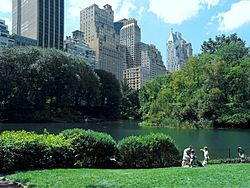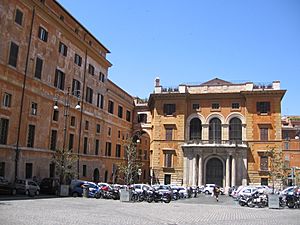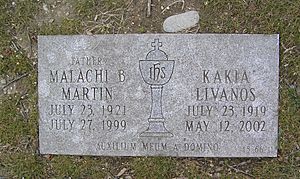Malachi Martin facts for kids
Quick facts for kids
Malachi Brendan Martin
|
|
|---|---|
| Born | 23 July 1921 Ballylongford, County Kerry, Ireland |
| Died | 27 July 1999 (aged 78) New York, New York, U.S. |
| Pen name | Michael Serafian |
| Occupation | Biblical archaeologist Catholic priest Exorcist Novelist Professor Theologian |
| Nationality | Irish, American |
| Relatives | F. X. Martin (brother) |
Malachi Brendan Martin (born July 23, 1921 – died July 27, 1999) was an Irish-born American Catholic priest and writer. He was also known by the pen name Michael Serafian. Martin was a biblical archaeologist, exorcist, and professor. He wrote many books about the Roman Catholic Church.
He was ordained as a Jesuit priest. Later, he became a professor at the Pontifical Biblical Institute in Rome. From 1958, he worked as a secretary for Cardinal Augustin Bea. This was during the time the Second Vatican Council was being planned. Martin became unhappy with the changes from Vatican II. In 1964, he asked to be released from some of his Jesuit promises and moved to New York City.
Martin wrote 17 novels and non-fiction books. Many of his books were critical of the Catholic leaders. He believed they had not acted on what he called "the Third Prophecy." This prophecy was said to be revealed by the Virgin Mary at Fátima. His book The Final Conclave (1978) warned about Soviet espionage (spying) in the Vatican.
Contents
Malachi Martin's Early Life and Education
Growing Up in Ireland
Malachi Martin was born in Ballylongford, County Kerry, Ireland. He came from a middle-class family. At home, the children spoke Irish at the dinner table. His parents, Conor and Katherine Fitzmaurice Martin, had ten children. Four of their five sons became priests. This included his younger brother, Francis Xavier Martin.
Martin went to Belvedere College in Dublin. Then he studied philosophy for three years at University College Dublin. On September 6, 1939, he joined the Society of Jesus as a novice.
Becoming a Priest and Scholar
Martin taught for three years. He spent four years at Milltown Park, Dublin. He was ordained as a priest in August 1954. After finishing his degree in Dublin, Martin went to the Catholic University of Louvain in Belgium. There, he earned a doctorate in archaeology, Oriental history, and Semitic languages.
He also did postgraduate studies at the Hebrew University of Jerusalem and the University of Oxford. Martin focused on studies about the time between the Old and New Testaments. He also studied Jesus in Jewish and Islamic writings. He learned about Ancient Hebrew and Arabic manuscripts. He also studied psychology, physics, and anthropology.
Malachi Martin's Work and Career
Research and Vatican Service
Martin helped with research on the famous Dead Sea Scrolls. He published 24 articles about Semitic palaeography (the study of old writing). He also did archaeological research in places like Byblos, Tyre, and the Sinai Peninsula. While working in Egypt, he helped with his first exorcism. In 1958, he published a two-volume work called The Scribal Character of the Dead Sea Scrolls.
In 1958, Martin became a private secretary to Cardinal Augustin Bea. He worked with him in the Vatican until 1964. During this time, the Second Vatican Council (1962–65) began. This council changed the Catholic Church. Martin, who was initially open to changes, started to find them upsetting.
In Rome, Martin became a professor at the Pontifical Biblical Institute. He taught Aramaic, Hebrew, palaeography, and Sacred Scripture. He also taught theology part-time at Loyola University Chicago's John Felice Rome Center. Martin worked as a translator for different Christian churches. He met Jewish leaders like Rabbi Abraham Joshua Heschel in the early 1960s. In January 1964, Martin traveled with Pope Paul VI to Jordan. He left his position at the Pontifical Institute in June 1964.
Life in New York and Writing Career
In 1964, Martin asked to be released from his vows as a Jesuit. He received a temporary release in May 1965. He was fully released from his vows of poverty and obedience in June 1965. Martin always said he remained a priest, stating that Pope Paul VI had given him special permission for this.
Martin moved to New York City in 1966. He worked different jobs like a dishwasher and taxi driver while continuing to write. He also helped start an antiques business. He was involved in media and communication for the rest of his life.

In 1967, Martin received his first Guggenheim Fellowship. This is a special award for people in the arts and sciences. In 1970, he published The Encounter: Religion in Crisis. This book won an award from the American Library Association. He then published Three Popes and the Cardinal (1972) and Jesus Now (1973). In 1970, Martin became a naturalized U.S. citizen.
He received a second Guggenheim Fellowship in 1969. This helped him write his first of four bestsellers, Hostage to the Devil: The Possession and Exorcism of Five Living Americans (1976). In this book, Martin said he was an exorcist and had helped with several exorcisms.
Martin was a religious editor for the National Review from 1972 to 1978. He was also interviewed on the TV show Firing Line. He worked as an editor for the Encyclopædia Britannica.
He published many books, including:
- Hostage to the Devil: The Possession and Exorcism of Five Living Americans (1976)
- The Final Conclave (1978)
- King of Kings: a Novel of the Life of David (1980)
- Vatican: A Novel (1986)
- The Pilgrim (1964)
- The Encounter (1970)
- The Decline and Fall of the Roman Church (1981)
- The New Castle: Reaching for the Ultimate (1982)
- Rich Church, Poor Church: The Catholic Church and its Money (1984)
- There is Still Love: Five Parables of God's Love That Will Change Your Life (1984)
His bestselling non-fiction book from 1987 was The Jesuits: The Society of Jesus and the Betrayal of the Roman Catholic Church. In this book, he was very critical of the Jesuit Order. He accused them of weakening church teachings.
Later Years and Death
Martin was a frequent guest on Art Bell's radio show, Coast to Coast AM, from 1996 to 1998. His interviews are still played on the show, especially around Halloween.
His book The Keys of This Blood: The Struggle for World Dominion between Pope John Paul II, Mikhail Gorbachev, and the Capitalist West came out in 1990. This was followed by Windswept House: A Vatican Novel in 1996.
The Vatican allowed Martin to celebrate Mass again in 1989, after he asked. He was supported by some Traditionalist Catholic groups. He was also criticized by others, like the National Catholic Reporter. Martin was a guest commentator for CNN in October 1995. This was during the live coverage of Pope John Paul II's visit to the United States.
In his last three years, Martin became good friends with the Traditionalist Catholic philosopher Rama P. Coomaraswamy. During this time, Martin had a private meeting with Pope John Paul II.
Malachi Martin died in Manhattan in 1999. He passed away from a brain bleed, four days after his 78th birthday. This was caused by a fall in his apartment. A documentary called Hostage to the Devil claimed that Martin said he was pushed from a stool by a demonic force.
Martin's funeral was held at St. Anthony of Padua Roman Catholic Chapel in West Orange, New Jersey. He was buried at Gate of Heaven Cemetery in Hawthorne, New York.
Malachi Martin's Writings and Ideas
Writing Under a Pseudonym
In 1964, Martin wrote The Pilgrim: Pope Paul VI, the Council, & the Church in a Time of Decision using the name "Michael Serafian." This book shared Martin's thoughts on the Second Vatican Council. Martin's fictional books often claimed to give inside details about Church history. They covered the time of Popes Pius XII, John XXIII, Paul VI, John Paul I, and John Paul II.
Views on Fatima Secrets
Martin often talked and wrote about the Three Secrets of Fátima. He strongly supported Father Nicholas Gruner's ideas about them. Martin believed that the third secret of Fatima, which had not been fully released, said that the Soviet Union would become Christian. The Vatican released what it said was the third secret letter in 2000. This text did not mention Russia or the Soviet Union.
See also
- Franz König
- Marcel Lefebvre
- Leo Joseph Suenens
Related books and articles
- .



